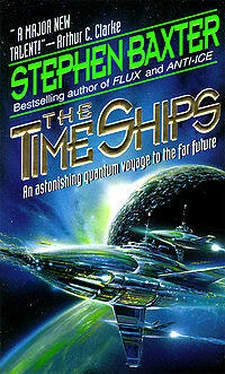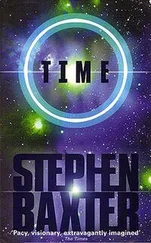Nebogipfel’s battered eyes were huge in that arboreal gloom. “Look around,” he said.
The greenery pressed about us with as much persistence as before — and yet now the texture seemed different. I found that — with care — I was able to follow the evolution of single leaves on the crowding branches. Each leaf sprang from the dust, went through a sort of reverse withering, and crumpled into its bud in less than a second, but even so -
“We are slowing,” I breathed.
“Yes. The Plattnerite is losing its potency, I think.”
I uttered a prayer of thanks — for my strength had recovered sufficiently that I no longer wished to die on some airless, rocky plain at the dawn of the earth!
“Do you know where we are?”
“Somewhere in the Palaeocene Era. We’ve been traveling for twenty hours. We are perhaps fifty million years before the present…”
“Whose present? — mine, of 1891, or yours?”
He touched the blood still matted over his face. “On such time-scales it scarcely matters.”
The blossoming of leaves and flowers was now quite slow — almost stately. I became aware of a flickering, of impermanent intrusions of deeper darkness, superimposed on the general green gloom. “I can distinguish night and day,” I said. “We’re slowing.”
“Yes.” The Morlock sat on the bench opposite me and gripped its edge with his long fingers. I wondered if he was afraid — he had every right to be! I thought I saw a motion in the floor of the car, a gentle, upward bulging below Nebogipfel’s bench.
“What should we do?”
He shook his head. “We can only wait on events. We are hardly in a controlled situation…”
The flapping of night and day slowed further, until it became a steady pulse around us, like a heartbeat. The floor creaked, and I saw stress-marks appear in its steel plates…
Suddenly I understood!
I cried, “Look out!” I stood, reached over and grabbed Nebogipfel by the shoulders. He did not resist. I lifted him as if he were a skinny, hairy child, and stumbled backwards -
— and a tree accreted out of the air before me, ripping the car’s metal like paper. One immense branch probed towards the controls like the arm of some huge, purposeful man of wood, and smashed through the casing’s front panel.
We were evidently arriving in the space occupied by this tree, in this remote era!
I fell backwards against a bench, cradling Nebogipfel. The tree shrank a little, as we receded towards the moment of its birth. The flapping of night and day grew slower, still more ponderous. The trunk narrowed further — and then, with an immense crack, the cabin of the car broke in two, snapped open from within like an egg-shell.
I lost hold of Nebogipfel, and the Morlock and I tumbled to the soft, moist earth, amid a hail of metal and wood.
[BOOK FOUR]
The Palaeocene Sea
I found myself on my back, peering up at the tree which had riven through our Time-Car as we fell out of diluted presentation. I heard Nebogipfel’s shallow breathing close by, but I could not see him.
Our tree, now frozen in time, soared up to join its fellows in a canopy, thick and uniform, far above me, and shoots and seedlings sprouted from the ground around its base, and through the wrecked components of the car. The heat was intense, the air moist and difficult for my straining lungs, and the world around me was filled with the coughs, trills and sighs of a jungle, all overlaid on a deep, richer rumble which made me suspect the presence of a large body of water nearby: either a river — some primeval version of the Thames — or a sea.
It was more like the Tropics than England!
Now, as I lay there and watched, an animal came clambering down the trunk towards us. It was something like a squirrel, about ten inches long, but its coat was wide and loose, and hung about its body like a cloak. It carried a fruit in its little jaws. Ten feet from the ground this creature spotted us; it cocked its sharp head, opened its mouth — dropping its fruit and hissed. I saw that its incisor teeth divided at their tips, into five-pronged combs. Then it leapt headlong from its tree trunk. It spread its arms and legs wide and its cloak of skin opened out with a snap, turning the animal into a sort of fur-covered kite. It soared away into the shadows, and was lost to my view.
“Quite a welcome,” I gasped. “It was like a flying lemur. But did you see its teeth?”
Nebogipfel — still out of my sight — replied, “It was a planetatherium. And the tree is a dipterocarps — not much changed from the species which will survive in the forests of your own day.
I pushed my hands into the mulch under me — it was quite rotten and slippery — and endeavored to turn so that I could see him. “Nebogipfel, are you injured?”
The Morlock lay on his side, his head twisted so that he was staring at the sky. “I am not hurt,” he whispered. “I suggest we begin a search for—”
But I was not listening; for I had seen just behind him a beaked head, the size of a horse’s, pushing through the foliage, and dipping down towards the Morlock’s frail body!
For an instant I was paralyzed by shock. That hooked beak opened with a sort of liquid pop, and disc-shaped eyes fixed on me with every evidence of intelligence.
Then, with a heavy swoop, the great head ducked down and clamped its beak over the Morlock’s leg. Nebogipfel screamed, and his small fingers scrabbled at the ground, and bits of leaf clung to his coat of hair.
I scrambled backwards, kicking at the leaves to get away, and finished up against a tree trunk.
Now, with a crackle of smashed branches, the beast’s body came lumbering through the greenery and into my view. It was perhaps seven feet tall, and coated with black, scaly feathers; its legs were stout, with strong, clawed feet, and covered with a sagging yellow flesh. Residual wings, disproportionately small on that immense torso, beat at the air. This bird-monster hauled its head back, and the poor Morlock was dragged across the mulchy ground.
“Nebogipfel!”
“It is a Diatryma,” he gasped. “A Diatryma Gigantica, I — oh!”
“Never mind its phylogeny,” I cried, “get away from it!”
“I am afraid — I have no way to — oh!” Again his speech disintegrated into that wordless yowl of anguish. Now the creature twisted its head from side to side. I realized that it was endeavoring to club the Morlock’s skull against a tree trunk — no doubt as a preliminary to making a feast of his pale flesh!
I needed a weapon, and could think only of Moses’s wrench. I got to my feet and scrambled into the wreckage of our Time-Car. A profusion of struts, panels and wires lay about, and the steel and polished wood of 1938 looked singularly out of place in this antique forest. I could not see the wrench! I plunged my arms, up to the elbows, into the decaying ground cover. It took long, agonizing seconds of searching; and all the while the Diatryma dragged its prize further towards the forest.
And then I had it! — my right arm emerged from the compost clasping the handle of the wrench.
With a roar, I raised, the wrench to shoulder height and plunged through the mulch. Diatryma’s bead-like eyes watched me approach — it slowed its head-shaking — but it did not loosen its grip on Nebogipfel’s leg. It had never seen men before, of course; I doubted that it understood that I could be a threat to it. I kept up my charge, and tried to ignore the awful, scaly skin around the claws of the feet, the immensity of the beak, and the whiff of decaying meat that hung about the thing.
Читать дальше
Конец ознакомительного отрывка
Купить книгу









